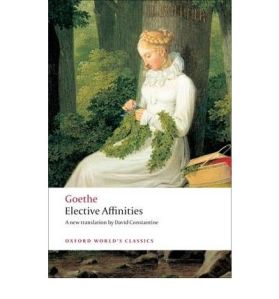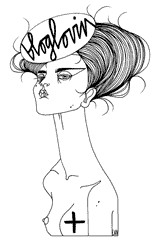Elective Affinities by Johann Wolfgang von Goethe
18 November, 2014
I confess I’ve only read one book by Goethe which was Faust because who didn’t try that one as a student? But I don’t remember much of it and I probably raced through it without really thinking about it much. So although I’ve been wanting to try more of Goethe’s novels, I only retain memories of something dark and heavy. So what a revelation Elective Affinities turned out to be. Chosen as my October/November’s book group read, the novel showcased Goethe’s lightness of touch and acute sensibilities which are so finely tuned that you really feel you are in the presence of a master. What could so easily have turned into a heavy, dank romantic tragedy was saved by the relentless self questioning of his characters and their wish to do the right thing.
Elective Affinities begins with Charlotte and Eduard who has been given a second chance at love. No longer in their first flush of youth and having overcome previous life events that were orchestrated by others, they are now happily enjoying the freedom of their simple coupledom. Charlotte’s daughter is away at school and so they spend their days organising and designing their house and land at their pleasure. In fact all their time is taken with pleasure. Happy but getting a little bored of their monotonous life, a visit from a scandalous aristocratic couple embeds ideas of love and affairs which slowly take root in their minds. Their fidelity is tested when Eduard’s close friend, the Captain, and Charlotte’s niece, Ottilie who is unhappy at school, come to stay.
Goethe melds his views on romanticism with the scientific ideals and advances from the Age of Enlightenment that was fashionable in 19th century Europe to create a story which mirrors science. Elective affinities, a concept in chemistry where elements naturally gravitate towards their optimal counterpart, is used here to illustrate the romantic leanings of the four main characters.
Eduard, a dynamic man, begins to feel an affinity for Ottilie who is equally smitten, and succumbs to temptation, albeit platonic. However Charlotte and the Captain are a bit more reserved, battling with their morals even though their feelings for each other are as fierce. The main focus of the novel is the love affair between Eduard and Ottilie, a reflection and dissection of the ideals and reality of what love is.
However there were a few things that perplexed me. For example, why did everyone love Ottilie so much? Because she is young and innocent? Eduard who is actually married sees nothing wrong in his feelings and nor does Ottilie until towards the end of the tale. Only Charlotte and the Captain seem commendable but Goethe seems more sympathetic towards Eduard and Ottilie as though he holds them much higher up as his romantic ideal, that theirs is the great love story with so many obstacles when in fact they could have really gotten together at any point. Ottilie’s refusal of Eduard doesn’t seem to have a moral aspect to it, more as a whim and feels self-indulgent. And personally I felt Eduard comes very close to being the villain of the piece, acting as though his marriage to Charlotte meant nothing. It seems as though he was going through a mid-life crisis and as a result I found it very difficult to sympathise with him. In fact, all the characters felt a little flat, especially the female characters, except for Charlotte’s aristocratic friends who revel in their scandalous lives. At least they don’t pretend to be good. And although there are tragic consequences to the choices these characters make, Goethe’s light touch stops short of making Elective Affinities a tragedy or even a moral tale, leaving the reader feeling rather confused.
It’s been several weeks since I’ve finished the book but I’m still wondering about the characters in Elective Affinities, especially Ottilie and Eduard. I wonder whether Goethe was drawing a parallel to himself and his own choices in life. However, the novella certainly made for an interesting discussion and I most certainly would like to read more by Goethe.
I read this as part of German Literature Month hosted by Caroline and Lizzy.












18 November, 2014 at 12:40 pm
oh, there’s definitely something autobiographical about Ottilie. She’s based on Minna Herzlieb, an 18 year old girl with whom Goethe fell in love in 1807 when he was 58 and had been married for only one year. Hmmmm….
18 November, 2014 at 2:06 pm
Hahaha, that’s what we all thought when we were discussing the book at book group. No wonder!
19 November, 2014 at 11:22 pm
I tried to read Faust again recently but just had to give up as my eyes were scanning the words but I wasn’t taking anything in. I mean to read Young Werther at some point but Elective Affinities looks like it might be better. I’m assuming that this was a later work.
20 November, 2014 at 10:05 am
Yes, it is a later work (and it’s not too long). The first half may seem a little slow but it really picks up pace towards the end in a surprising way. I hope you do give it a try. And I will try and re-read Faust again at some point too!